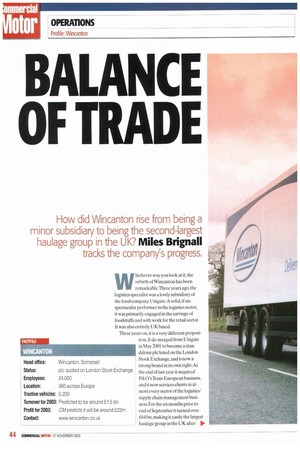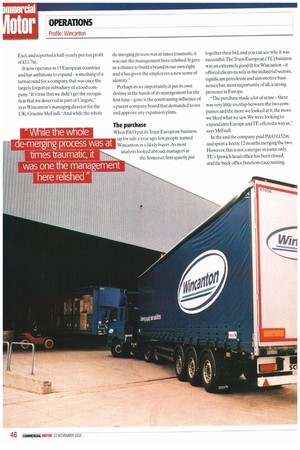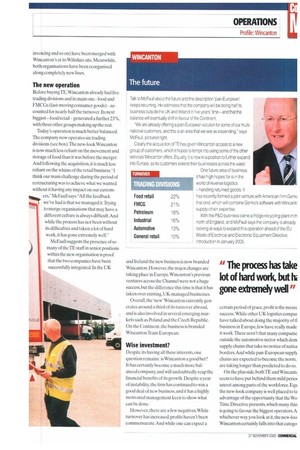BALANCE OF TRADE
Page 46

Page 48

Page 49

If you've noticed an error in this article please click here to report it so we can fix it.
How did Wincanton rise from being a minor subsidiary to being the second-largest
haulage group in the UK? Miles Brignall
tracks the company's progress.
Whichever way you look at it. the rebirth of Wincanton has been remarkable.Three years ago, the logistics specialist was a lowly subsidiary of the food company Unigate.A solid, if unspectacular performer in the logistics sector, it was primarily engaged in the carriage of foodstuffs and with work for the retail sector. It was also entirely UK based.
Three years omit is a very different proposition. It de-merged from Unigate in May 2001 to become a standalone plc listed on the London Stock Exchange, and is now a strong brand in its own right.At the end of last year it acquired P&O'sli.ans European business. and it now services clients in almost every sector of the logistics/ supply chain management business. For the six months prior to end of September it turned over £845m,making it easily the largest haulage group in the UK after PO. Exel, and reported a half-yearly pre-tax profit of £11.7m.
It now operates in 15 European countries and has ambitions to expand something of a turnaround for a company that was once the largely forgotten subsidiary of a food cornpany."It's true that we didn't get the recognition that we deserved as part of Unigate," says Wincanton's managing director for the UK, Graeme McFaull."And while the whole de-merging process was at times traumatic. it was one the management here relished. It gave us a chance to build a brand in our own right and it has given the employees a new sense of identity."
Perhaps more importantly. it put its own destiny in the hands of its management for the first time — gone is the constraining influence of a parent company board that demanded to see and approve any expansion plans.
The purchase
When P&O put itsTrans European business up for sale a year ago, few people named Wincanton as a likely buyer. As most analysts looked abroad, managers at the Somerset firm quietly put together their bid, and you can see why it was successful.The Trans European (TE) business was an extremely good lit for Wincanton — it offered clients mostly in the industrial sectors, significant petroleum and automotive businesses but, most importantly of all, a strong presence in Europe.
"The purchase made a lot of sense — there was very little overlap between the two companies and the more we looked at it, the more we liked what we saw. We were looking to expand into Europe andTE offered a way in," says McFaull.
In the end the company paid P&O £152m, and spent a hectic 12 months merging the two. However, this is not a merger in name only. TE's Ipswich head office has been closed, and the back office functions (accounting, invoicing and so on) have been merged with Wineanton's at its Wiltshire site. Meanwhile. both organisations have been reorganised along completely new lines.
The new operation
Before buying TE,Wincanton already had five trading divisions and its main one food and FMCGs (fast-moving consumer goods) accounted for nearly half the turnover. Its next biggest food/retail generated a further 23%, with three other groups making up the rest.
Today's operation is much better balanced. The company now operates six trading divisions (see box).The new-look Wincanton is now much less reliant on the movement and storage of food than it was before the merger. And following the acquisition, it is much less reliant on the whims of the retail business. think our main challenge during the period of restructuring was to achieve what we wanted without it having any impact on our austomers."McFaull says."All the feedback we've had is that we managed it.Trying to merge organisations that may have a different culture is always difficult.And while the process has not been without its difficulties and taken a lot of hard work, it has gone extremely well."
McFaull suggests the presence of so many of the TE staff in senior positions within the new organisation is proof that the two companies have been successfully integrated. In the UK and Ireland the new business is now branded Wincanton. However, the major changes are taking place in Europe.Wincanton's previous ventures across the Channel were not a huge success, but the difference this time is that it has taken over existing. UK-managed businesses.
Overall, the 'new' Wincanton currently generates around a third of its turnover abroad. and is also involved in several emerging markets such as Poland and the Czech Republic. On the Continent, the business is branded Wincanton`Rans European.
Wise investment?
Despite its having all these interests,one question remains: is Wincanton a good bet? It has certainly become a much more balanced company,and will undoubtedly reap the financial benefits of its growth. Despite a year of instability, the firm has continued to win a good deal of new business, and it has a highly motivated management keen to show what can be done.
However, there are a few negatives.While turnover has increased.profits haven't been commensurate. And while one can expect a certain period of grace, profit is the measu success. While other UK logistics compar have talked about doing the majority of ti business in Europe,few have really made it work.'There aren't that many companie outside the automotive sector which dem supply chains that take no notice of natio' borders.And while pan-European supply chains are expected to become the norm, are taking longer than predicted to do so.
On the plus side, both TE and Wincant( seem to have put behind them mild perioi unrest among parts of the workforce. Equ the new-look company is well placed to ta advantage of the opportunity that the Wo Time Directive presents, which many thin is going to favour the biggest operators.A whichever way you look at it.the new-loo Wincanton certainly falls into that catego


























































































































































































